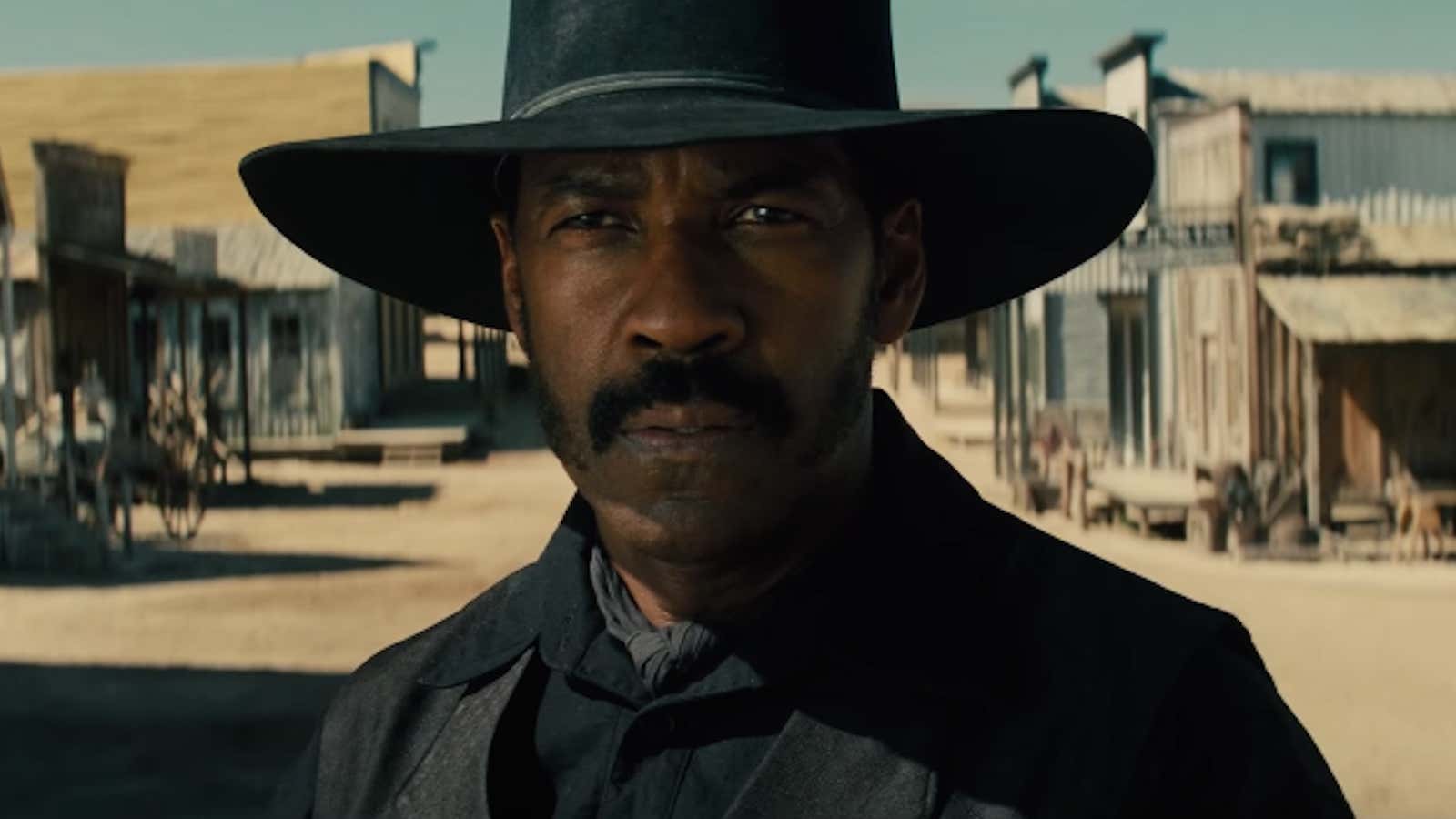The 1960 Western film Magnificent Seven managed a rare feat: it whitewashed its source material while simultaneously whitewashing its own updated setting. The 2016 remake, starring Denzel Washington and Chris Pratt, upholds this troubling tradition. Its heroes are more diverse, but the logic of whitewashing persists. Hollywood has taken a Japanese film about class tensions and, through successive iterations, created a post-racial Western that spends most of its time and energy reassuring white people of their own virtue.
The original source material, Akira Kurosawa’s classic Seven Samurai (1954), was set in early modern Japan. Peasants menaced by bandits hire a ragtag group of samurai to protect them. In translating this to American screens, 1962 film director John Sturges set the film in a Mexican border village. He then cast white people for the most prominent Mexicans; most notably Eli Wallach plays lead bandit Calvera and Vladimir Sokoloff plays the village elder. More, Sturges changed the original so that instead of upper-class Japanese saving lower-class Japanese, the film featured white people (playing white people) rescuing Mexicans (also sometimes played by white people.) The result was a white savior narrative in which white people both displaced and rescued people of color. Magnificent indeed.
African-American director Antoine Fuqua has taken pains not to follow the same path in his 2016 Magnificent Seven remake. The heroes in the film are racially diverse; the leader, Sam Chisolm, is played by Washington. Fuqua succeeds in providing viewers of all races with heroes of all races, a rarity on American screens. And yet, problems persist.
Despite its multi-ethnic heroes, the film’s ensemble as a whole is actually whiter than its 1960 predecessor. Instead of setting the film in a Mexican village, Fuqua recasts the besieged townspeople as white farmers resisting the incursion of the villainous mining magnate Bartholomew Bogue (Peter Sarsgaard). Rather than having people of color save themselves, in other words, Fuqua has people of color saving white people.
This begs a lot of questions—none of which the film seems willing to answer, or even raise. Sam Chisolm repeatedly notes that he’s a duly sworn bounty hunter and an official agent of the federal and territorial governments. A black law enforcement officer in the 1800s would have represented an insupportable affront to racial hierarchy. White racist men would have been coming out of the woodwork to try to kill Chisolm—as they try to kill the black bounty hunter in Quentin Tarantino’s 2015 Hateful Eight. But in the Magnificent Seven‘s fantasy West, no one seems to notice that Chisolm is black: The world it portrays is oddly, and even eerily, post-racial.
Race isn’t completely invisible—there are brief moments of acknowledgement. Billy Rocks (Byung-hun Lee), an Asian knife expert, mentions that he’s had some trouble with white men. Irish rogue Josh Farraday (Chris Pratt) tosses a friendly racial slur or two at Mexican outlaw Vasquez (Manuel Garcia-Rulfo). And the absence of a romantic plot suggests the screenwriters were aware of potential racial pitfalls. In the 1960 Magnificent Seven, a central subplot involves one of the white gunfighters falling for a Mexican woman, and staying behind in the village with her. A white man with a non-white woman is a typical Hollywood arc. In the remake, of course, the interracial relationship would presumably be between a man of color and a white woman. This is a storyline that’s much more difficult for Hollywood to imagine—and Magnificent Seven, dutifully, refuses to imagine it.
But while the Magnificent Seven declines to tackle interracial romance, it is very interested in the cleansing power of interracial friendship. Goodnight Robicheaux (Ethan Hawke) is a former Confederate soldier with, improbably, no trace of racial prejudice—and the film lines up people of color to testify to his purity of soul. Billy Rocks, the Asian knife expert, is his best friend. Chisolm, for his part, assures Robicheaux that “the war is over,” forgiving him on behalf of all black people for his violent defense of slavery.
The handling of native people is even more duplicitous. The last man to join the heroes is Comanche Red Harvest (Martin Sensmeier), who just shows up out of the hills, muttering something about destiny and paths. In a climactic scene, he saves the female lead Emma Cullen (Haley Bennett) from another Comanche in the employ of the evil Bogue, declaring: “You’re a disgrace.” Why it’s a disgrace for a Native American to fight for the land rights of this white genocidal settler rather than the land rights of that white genocidal settler is unclear. But, for whatever reason, a “good Indian” has vouched for them, and so the white people can go back to farming “their” land with a clear conscience.
The original Seven Samurai was about feudal class tensions. The farmers were debased and exploited by the samurai, whom they hated and feared, and deceived or killed when they could. While the heroic seven samurai grow to like and even love the townspeople—the class barrier never goes away. “The farmers have won, not us,” is perhaps the film’s most famous line, pointing to the inevitable victory of civilization, and the end, for better or worse, of the samurai honor code.
The 1960 Magnificent Seven nervously paid homage to these class fault lines with a throwaway line or two, though it didn’t explore them in any depth. In 2016, though, they’ve entirely disappeared. If the film were to address the tension and prejudice between the townspeople and the heroes, it would have to address racial animosity, which it categorically refuses to do. In refusing to think about race, the film is also forced to ignore class, and ends up not thinking about much of anything. Through successive rounds of whitewashing, one of the great works of cinema has been transformed into a bland, brainless multiplex shoot-em-up.
Though, to be fair, this latest iteration has many more explosions than either of its predecessors. So that’s something.
